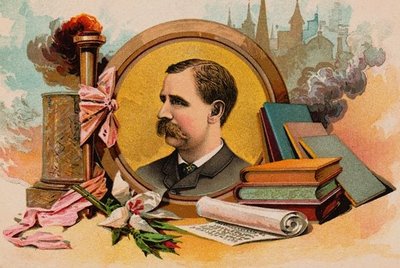
LITR 5439 Literary & Historical Utopias
|
Looking Backward 2000-1887 (published 1887) by Edward Bellamy |
 Edward Bellamy (1850-1898) |
online text for LITR 5439 Utopias
Looking Backward, 2000-1887 may be the best-known and most influential utopian novel in classic American literature. Appearing near the end of the Gilded Age and the beginning of the Progressive Era, the novel offered hope that the United States might rationally resolve conflicts between capital and labor through national political action. Bellamy's clear, earnest prose presented large-scale change in non-threatening terms and settings. Only two other novels of the 19th century--Harriet Beecher Stowe's Uncle Tom's Cabin (1851-2) and Lew Wallace's Ben-Hur: A Tale of the Christ (1880)--sold more copies; only Stowe's had greater political impact. Looking Backward's effect cannot be measured as directly as Uncle Tom's Cabin's precipitation of the Civil War, but its depiction of a fairer economic life encouraged a network of "Nationalist Clubs" and other organizations that discussed ways of bringing Bellamy's vision to reality. These discussions circulated ideas that found expression in the Progressive Movement involving regulation of industry and workers' rights. Also like Uncle Tom's Cabin, Looking Backward stimulated a surprising number of literary responses and sequels.
Literary appeals in 1887:
Socratic dialogues describing utopia occur in sitting rooms, dining rooms, etc., conforming to domestic literature, validation of family, sanctuary of home life.
Financial stresses, labor strife, & increasing inequality of Gilded Age make tranquility attractive. (Compare suburbs-as-utopia after Great Depression / WW2)
Readable popularization of economics
Utopian genre conventions:
Outsider (time-)travels to utopian community, narrates observations, conversations, conflicts and resolutions (Julian West)
Utopian resident acts as guide, instructor, or counselor, engaging in Socratic dialogues with visitor. (Dr. Leete)
Love-interest parallels initiation to utopian community (cf. Herland, Ecotopia) (Julian falls in love with Dr. Leete's daughter, Edith, who is descended from Julian's fiancee in 1887, also named Edith--compare The Mummy for reincarnation love story)
Reference to "millennium" as change from dystopia to utopia. (19.18-19)
Chapter 26: "Mr. Barton's Sermon": introduction of non-fiction text or monologic discourse; cf. The Fountainhead
12.29 extended family metaphor
Gardens!
[3.61]
At my feet lay a great city. Miles of broad streets, shaded by
trees and lined with fine buildings, for the most part not in continuous
blocks but set in larger or smaller inclosures, stretched in
every direction. Every quarter contained large open squares
filled with trees, among which statues glistened and fountains flashed
in the late afternoon sun. Public buildings of a colossal size and an
architectural grandeur unparalleled in my day raised their
stately piles on every side. Surely I had never seen this city nor one
comparable to it before. Raising my eyes at last towards the horizon, I
looked westward. That blue ribbon winding away to the sunset, was it not
the sinuous Charles [River]? I looked east;
26.35 gardeners
Problems for later readers:
The utopia is a fait accompli, so no conflicts
or quests for improvement. (Cf. Ian on how
Limitation of setting to sitting rooms and shops prevents observation of actual work-places. 14.9 (the waiter)
Advantages for later readers:
Clear, competent prose: not much may be happening, but at least a reader doesn't have to struggle to read. Also not very long, so doesn't take long to add another "classic" to your list.
Edward Bellamy's cousin wrote the Pledge to the American Flag
Edward Bellamy, a 19th-Century Visionary
Progressive Era (1890s-1910s)
